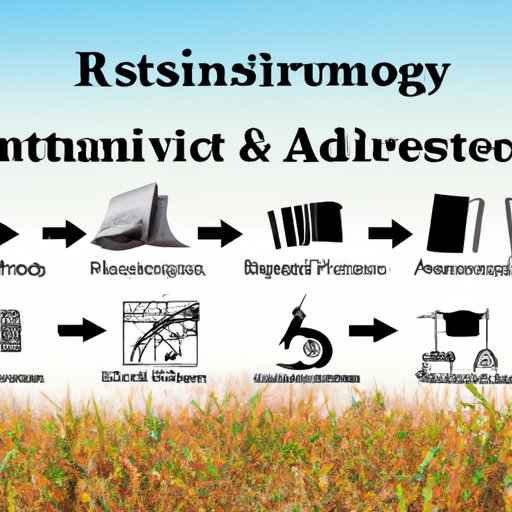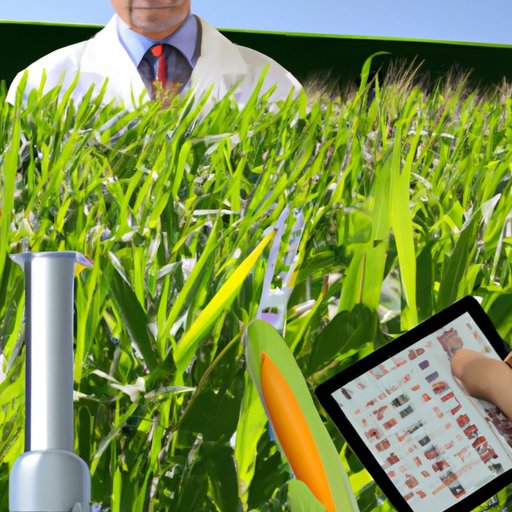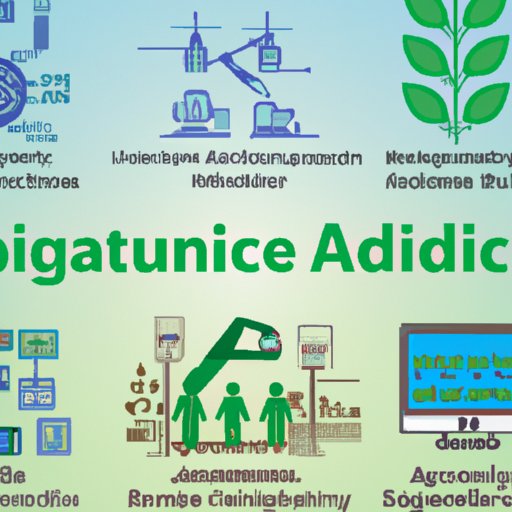Introduction
Agriculture science is a field of study that focuses on the production and management of food, fiber, and other resources obtained from plants and animals. It is an interdisciplinary field that incorporates aspects of biology, chemistry, economics, engineering, and other sciences to maximize efficiency and productivity in the agricultural sector. This article will explore the basics of agriculture science, its history and evolution, modern practices, and its impact on global food security.
Exploring the Basics of Agriculture Science
At its core, agriculture science deals with the management and production of food, fiber, and other resources obtained from plants and animals. It involves applying scientific principles to increase yields, reduce costs, and improve the quality of products. It also looks at ways to conserve natural resources, protect the environment, and promote sustainable agricultural practices.
The different types of agriculture science include agronomy, horticulture, animal science, soil science, food science, and agricultural economics. Agronomy is the science of crop production and soil management, while horticulture is the science of cultivating plants and managing gardens. Animal science deals with the care and management of livestock, while soil science examines the physical, chemical, and biological properties of soils. Food science looks at the processing, packaging, and storage of food, while agricultural economics studies the production, distribution, and consumption of agricultural goods.
Agricultural scientists use their knowledge and expertise to develop new technologies and techniques that can be used to improve the production of food and other resources. They also work to ensure the sustainability of agricultural systems by promoting conservation practices and minimizing environmental impacts.

The History and Evolution of Agriculture Science
Agriculture science has evolved over time as humans have developed new technologies and techniques to improve the production of food and other resources. In pre-industrial times, farmers relied on traditional methods such as crop rotation and animal husbandry to increase yields and improve the quality of products. During the industrial revolution, advances in machinery, fertilizers, and pesticides enabled farmers to produce larger quantities of food with less effort.
Modern practices in agriculture science include the use of sustainable agriculture, precision agriculture, organic farming, and biotechnology. Sustainable agriculture is the practice of using natural resources responsibly and efficiently in order to meet current needs without compromising the ability of future generations to do the same. Precision agriculture uses advanced technologies such as robotics, automation, and big data to optimize crop production and reduce inputs. Organic farming is the practice of growing crops without the use of synthetic fertilizers and pesticides. Finally, biotechnology is the use of genetic engineering to create new organisms or modify existing ones for specific purposes.

Understanding Modern Practices in Agriculture Science
Sustainable agriculture is a key practice in modern agriculture science. It seeks to reduce the environmental impacts of farming, conserve natural resources, and increase yields. To achieve these goals, farmers employ practices such as cover cropping, crop rotation, composting, and integrated pest management. These practices help to maintain soil fertility, reduce erosion, and conserve water.
Precision agriculture is an important tool in modern agriculture science. It uses advanced technologies such as robotics, automation, and big data to increase efficiency and reduce inputs. By collecting and analyzing data on soil conditions, crop growth, and weather patterns, farmers can optimize their operations and make informed decisions about when and where to plant, irrigate, and harvest.
Organic farming is another modern practice in agriculture science. It is the practice of growing crops without the use of synthetic fertilizers and pesticides. Organic farmers use natural methods such as crop rotation and companion planting to control pests and diseases. They also rely on natural fertilizers such as compost and manure to provide essential nutrients to plants.
Finally, biotechnology is being used in agriculture science to create new organisms or modify existing ones for specific purposes. Genetically modified organisms (GMOs) are created by introducing foreign DNA into an organism’s genome. GMOs can be used to create crops that are more resistant to pests and diseases, require fewer inputs, and produce higher yields.
The Role of Technology in Agriculture Science
Technology plays an important role in modern agriculture science. Automation and robotics are being used to reduce labor costs and increase efficiency. For example, robotic tractors can be used to plow fields, plant seeds, and spray fertilizer. Automated milking machines can be used to milk cows faster and more efficiently.
Big data is also playing an increasingly important role in agriculture science. By collecting and analyzing data on soil conditions, crop growth, and weather patterns, farmers can make informed decisions about when and where to plant, irrigate, and harvest. Big data can also be used to identify areas where yields are low and develop strategies to improve them.
How Agriculture Science Impacts Global Food Security
Agriculture science plays an important role in meeting global food needs. By developing new technologies and techniques, agricultural scientists are able to increase yields, reduce costs, and improve the quality of products. This helps to ensure that everyone has access to safe and nutritious food.
Strategies for improving food security include increasing investment in research and development, promoting sustainable agricultural practices, and reducing food waste. Investing in research and development can lead to the development of new technologies and techniques that can help to increase yields and reduce costs. Promoting sustainable agricultural practices such as crop rotation and integrated pest management can help to conserve natural resources and protect the environment. Reducing food waste can help to ensure that more people have access to safe and nutritious food.

Examining the Future of Agriculture Science
The field of agriculture science is constantly evolving, and there are many challenges facing the field in the future. One challenge is the need to develop new technologies that can increase yields and reduce inputs. There is also a need to develop strategies for adapting to climate change and preserving biodiversity. Additionally, there is a need to ensure that agricultural practices are socially and economically equitable.
Potential solutions to these challenges include investing in research and development, promoting sustainability, and encouraging public-private partnerships. Investing in research and development can lead to the development of new technologies and techniques that can help to increase yields and reduce inputs. Promoting sustainability can help to conserve natural resources, protect the environment, and ensure the long-term viability of agricultural systems. Finally, encouraging public-private partnerships can help to ensure that agricultural practices are socially and economically equitable.
Conclusion
Agriculture science is an interdisciplinary field that incorporates aspects of biology, chemistry, economics, engineering, and other sciences to maximize efficiency and productivity in the agricultural sector. It has evolved over time, and modern practices include sustainable agriculture, precision agriculture, organic farming, and biotechnology. Technology is playing an increasingly important role in agriculture science, and it has had a significant impact on global food security. Looking ahead, there are many challenges facing the field of agriculture science, but potential solutions include investing in research and development, promoting sustainability, and encouraging public-private partnerships.
(Note: Is this article not meeting your expectations? Do you have knowledge or insights to share? Unlock new opportunities and expand your reach by joining our authors team. Click Registration to join us and share your expertise with our readers.)
